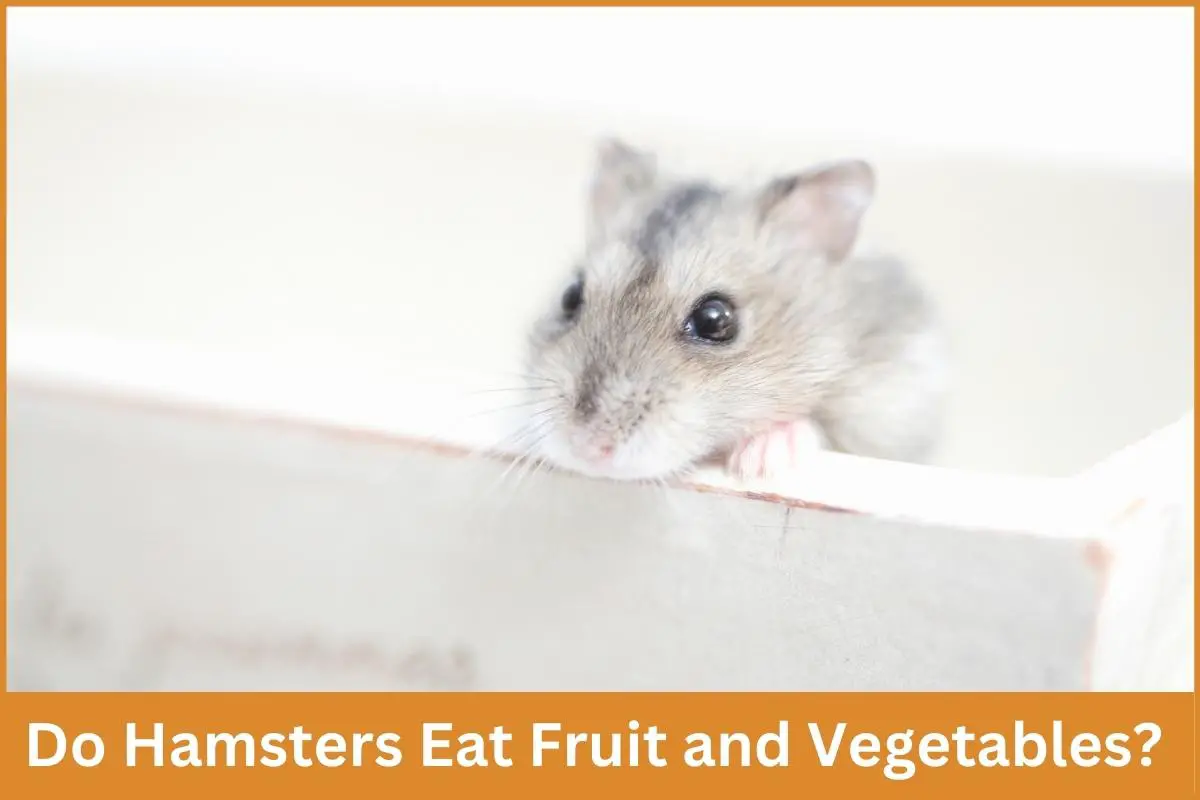Yes, hamsters can eat fruits and vegetables in moderation as part of a balanced diet. However, not all fruits and vegetables are safe for them, so it is important to research and choose options that are hamster-friendly. Avoid giving them citrus fruits, onions, or anything that contains high amounts of sugar or acidity.

Key Takeaways
- Hamsters can safely eat fruits and vegetables such as apples, carrots, broccoli, cucumber, and sweet potatoes.
- It is important to feed fruits and vegetables in moderation and cut them into small pieces for easy consumption.
- High sugar or acidity fruits and vegetables should be avoided, and all fruits and vegetables should be washed before feeding.
- Hamsters should receive no more than one tablespoon of fruits and vegetables per day, and their weight should be monitored to adjust the amount accordingly.
What Fruits and Vegetables Are Safe for Hamsters
You can safely give your hamster certain fruits and vegetables, such as apples, carrots, broccoli, and cucumber. But it’s important to avoid any high in sugar or acidity, like citrus fruits or onions.
Hamsters need to have a balanced diet, with fruits and vegetables in moderation. Some other safe options include sweet potatoes, squash, and bell peppers. Make sure to cut these items into small pieces that your hamster can manage.
Always research any food before giving it to your pet to make sure it’s safe. Never feed your hamster any wild fruits or vegetables, as they could be contaminated with pesticides or other toxins.
How Much Fruit and Vegetables Should Hamsters Have
You can give your hamster fruits and vegetables, but you should limit the amount. Too much of either can lead to serious health issues such as obesity or diabetes. Generally, it’s recommended that hamsters receive no more than one tablespoon of fruits and vegetables per day. This should be given in small pieces rather than large chunks, as hamsters may have trouble chewing larger pieces.
It is important to choose the right fruits and vegetables for your hamster. Citrus fruits, onions, and anything with high sugar or acidity levels should be avoided. The best choice is to provide your hamster with a variety of fresh, washed, and chopped vegetables and fruits.
It is also important to monitor your hamster when providing them with fruits and vegetables. If they seem to be gaining weight, reduce the amount you’re giving them. If they don’t seem to be interested in the food, try offering a different type of fruit or vegetable. Remember, variety is key!
Nutritional Benefits of Fruits and Vegetables for Hamsters
You can provide your hamster with nutritional benefits by offering them a variety of fruits and vegetables. Different types of fruits and vegetables can provide your hamster with essential vitamins and minerals that are necessary for a healthy diet. Fruits and vegetables like apples, pears, carrots, and broccoli are good sources of fiber, which helps keep their digestive system healthy. Additionally, they provide your hamster with Vitamin A, which is important for healthy eyesight and skin.
It’s important to remember that moderation is key when feeding your hamster fruits and vegetables. Too much can lead to digestive problems, so it’s best to only offer small amounts at a time. Additionally, avoid giving them citrus fruits, onions, or anything that contains high amounts of sugar or acidity.
If you’re ever unsure what types of fruits and vegetables to offer, consult your local veterinarian for more advice.
Potential Risks of Eating Fruits and Vegetables
It is important to be aware of potential risks when feeding your hamster fruits and vegetables.
Citrus fruits, onions, and those containing high amounts of sugar or acidity should be avoided. Too much of these can be harmful to your hamster’s health. Eating too much fruit can also lead to obesity as it’s high in sugar. And certain vegetables can be hard to digest, leading to stomach problems.
Additionally, some fruits and vegetables contain toxins that can be toxic to hamsters. Therefore, it’s essential to research and choose hamster-friendly options, and to feed them in moderation.
Tips for Feeding Hamsters Fruits and Vegetables
You can safely feed your hamster fruits and vegetables, but it’s important to do so in moderation. Research which fruits and veggies are safe for hamsters and avoid those that contain high amounts of sugar or acidity, such as citrus fruits and onions.
When feeding your hamster fruits and vegetables, it’s best to chop them into small pieces. This will make it easier for your hamster to eat and digest them. Additionally, you should always wash the fruits and vegetables before feeding them to your hamster.
As a general rule, fruits and vegetables shouldn’t make up more than 10% of your hamster’s diet. Treats should only make up a small portion of your hamster’s diet and should be given in moderation. If you notice any signs of digestive upset or diarrhea, discontinue feeding your hamster the treats and consult your veterinarian.
Alternatives to Fruits and Vegetables for Hamsters
Besides fruits and vegetables, there are other options you can feed your hamster. Hamsters can also benefit from mixtures of seeds, nuts, and dried fruits, which should be given in small amounts.
Commercial hamster mixes are also a great way to add variety to their diet, as they contain a good balance of proteins, carbs, and fats.
You can also offer your hamster a few insects, such as mealworms or crickets, for an occasional treat.
Lastly, it’s important to provide your hamster with plenty of fresh water daily.

